【强烈推荐】人教版五年级下册英语知识点整理
- 格式:doc
- 大小:35.00 KB
- 文档页数:6
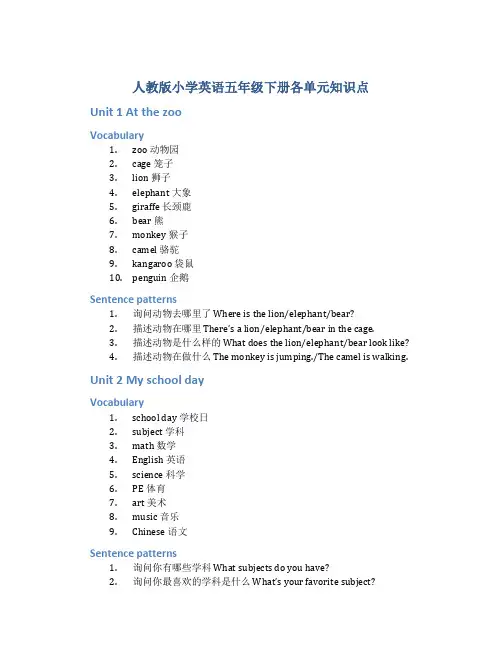
人教版小学英语五年级下册各单元知识点Unit 1 At the zooVocabulary1.zoo 动物园2.cage 笼子3.lion 狮子4.elephant 大象5.giraffe 长颈鹿6.bear 熊7.monkey 猴子8.camel 骆驼9.kangaroo 袋鼠10.penguin 企鹅Sentence patterns1.询问动物去哪里了 Where is the lion/elephant/bear?2.描述动物在哪里There’s a lion/elephant/bear in the cage.3.描述动物是什么样的 What does the lion/elephant/bear look like?4.描述动物在做什么 The monkey is jumping./The camel is walking. Unit 2 My school dayVocabulary1.school day 学校日2.subject 学科3.math 数学4.English 英语5.science 科学6.PE 体育7.art 美术8.music 音乐9.Chinese 语文Sentence patterns1.询问你有哪些学科 What subjects do you have?2.询问你最喜欢的学科是什么What’s your favorite subject?3.描述你正在上什么学科I’m having math/English/science class now.4.询问你在哪个班级 What class are you in?Unit 3 At a partyVocabulary1.party 派对2.balloon 气球3.present 礼物4.birthday 生日5.cake 蛋糕6.candle 蜡烛7.card 卡片Sentence patterns1.询问你们在庆祝什么 What are you celebrating?2.询问你送了什么礼物 What present did you bring?3.描述蛋糕上有多少个蜡烛 There are four candles on the cake.4.描述你在派对上吃了什么 I ate cake and drank soda.Unit 4 My clothesVocabulary1.clothes 衣服2.jacket 夹克衫3.shirt 衬衫4.dress 连衣裙5.skirt 短裙6.pants 裤子7.socks 袜子8.shoes 鞋子Sentence patterns1.询问你喜欢穿什么样的衣服 What clothes do you like to wear?2.询问今天你穿了什么衣服 What clothes are you wearing today?3.描述你的外套是什么样的 My jacket is blue.4.描述你的鞋子是什么颜色的 My shoes are red.Unit 5 My familyVocabulary1.family 家庭2.mother 母亲3.father 父亲4.sister 姐妹5.brother 兄弟6.grandmother 奶奶7.grandfather 爷爷8.aunt 阿姨9.uncle 叔叔Sentence patterns1.询问你有几口人家庭 How many people are there in your family?2.询问你和家人一起住吗 Do you live with your family?3.描述你的妈妈是什么样的 My mother is kind.4.描述你和兄弟姐妹的关系很好 My sister and I get along well.。
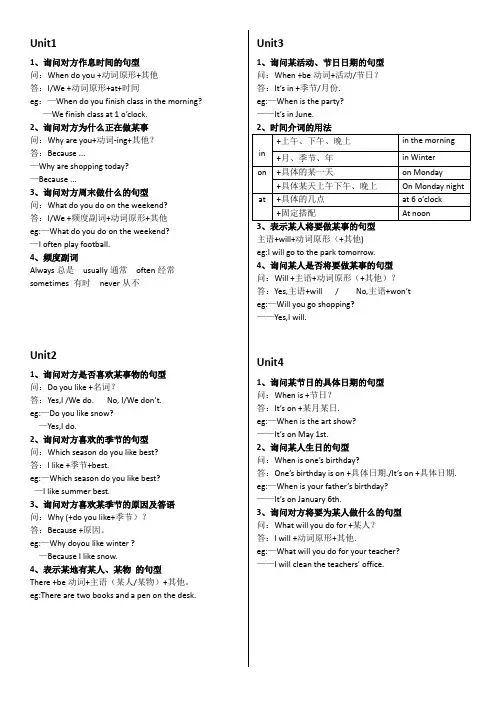
Unit11、询问对方作息时间的句型问:When do you +动词原形+其他答:I/We +动词原形+at+时间eg:—When do you finish class in the morning?—We finish class at 1 o’clock.2、询问对方为什么正在做某事问:Why are you+动词-ing+其他?答:Because ...—Why are shopping today?—Because ...3、询问对方周末做什么的句型问:What do you do on the weekend?答:I/We +频度副词+动词原形+其他eg:—What do you do on the weekend?—I often play football.4、频度副词Always总是usually通常often经常sometimes 有时never从不Unit21、询问对方是否喜欢某事物的句型问:Do you like +名词?答:Yes,I /We do. No, I/We don’t. eg:—Do you like snow?—Yes,I do.2、询问对方喜欢的季节的句型问:Which season do you like best?答:I like +季节+best.eg:—Which season do you like best?—I like summer best.3、询问对方喜欢某季节的原因及答语问:Why (+do you like+季节)?答:Because +原因。
eg:—Why doyou like winter ?—Because I like snow.4、表示某地有某人、某物的句型There +be动词+主语(某人/某物)+其他。
eg:There are two books and a pen on the desk.Unit31、询问某活动、节日日期的句型问:When +be动词+活动/节日?答:It’s in +季节/月份.eg:—When is the party?——It’s in June.主语+will+动词原形(+其他)eg:I will go to the park tomorrow.4、询问某人是否将要做某事的句型问:Will +主语+动词原形(+其他)?答:Yes,主语+will / No,主语+won’t eg:—Will you go shopping?——Yes,I will.Unit41、询问某节日的具体日期的句型问:When is +节日?答:It’s on +某月某日.eg:—When is the art show?——It’s on May 1st.2、询问某人生日的句型问:When is one’s birthday?答:One’s birthday is on +具体日期./It’s on +具体日期. eg:—When is your father’s birthday?——It’s on January 6th.3、询问对方将要为某人做什么的句型问:What will you do for +某人?答:I will +动词原形+其他.eg:—What will you do for your teacher?——I will clean the teachers’ office.1、描述物品归属的句型物品+ be动词(is/are)+(mine/his/hers/yours/ours/theirs) eg:The book is yours.2、确认物品归属地句型问:be动词+this/that/these/those(+其他)+某人的?答:Yes,it is. Yes,they are./ No,it,is’t. No,they aren’t. eg:—Is that crayou his?——Yes,it is.3、询问物品归属的句型问:单数Whose+is it/this/that?复数Whose+are they/these/those?答:It’s/They’re+名词性物主代词/ 名词所有格eg:—Whose bag is this?——It’s mine.4、现在进行时的一般疑问句问:Be动词+主语+动词-ing(+其他)?答:Yes,主语+be动词/ No,主语+be动词+not. eg:—Is she listening to music?——Yes,she is.5、描述某人正在做某事主语+be动词(am/is/are)+动词-ing(+其他).eg:I’m doing my homework now.6、询问某人能否做某事问:Can+主语+动词原形+其他?答:Yes,主语+can. /No,主语+can’t.eg:—Can I play football?——Yes,you can.Unit61、询问多个人或动物正在做什么的句型问:What are +主语(复数)+doing?答:主语(复数)+are+动词-ing+其他.eg:—What are the boys doing?——They are jumping2、询问单个人或动物正在做什么的句型问:What is +主语(单数)+doing?答:主语(单数)+is+动词-ing+其他.eg:—What is Tom doing?——He is playing football.。
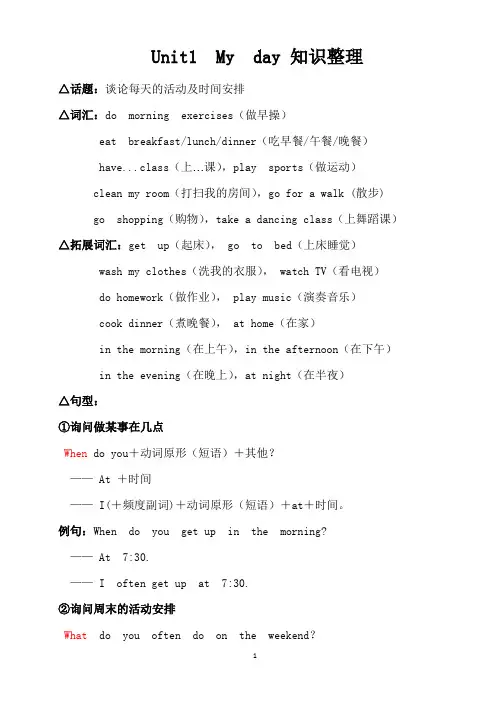
Unit1 My day 知识整理△话题:谈论每天的活动及时间安排△词汇:do morning exercises(做早操)eat breakfast/lunch/dinner(吃早餐/午餐/晚餐)have...class(上…课),play sports(做运动)clean my room(打扫我的房间),go for a walk (散步) go shopping(购物),take a dancing class(上舞蹈课)△拓展词汇:get up(起床), go to bed(上床睡觉)wash my clothes(洗我的衣服), watch TV(看电视)do homework(做作业), play music(演奏音乐)cook dinner(煮晚餐), at home(在家)in the morning(在上午),in the afternoon(在下午)in the evening(在晚上),at night(在半夜)△句型:①询问做某事在几点When do you+动词原形(短语)+其他?—— At +时间—— I(+频度副词)+动词原形(短语)+at+时间。
例句:When do you get up in the morning?—— At 7:30.—— I often get up at 7:30.②询问周末的活动安排What do you often do on the weekend?I often (always/sometime/usually) +…(周末的活动)+with … (某人)+on the weekend (on Saturdays/on Sundays ).例句:What do you do on the weekend ?I often take a dancing class with my friend on Sundays. △知识点:1:注意介词的搭配at +具体时间(几点)/night/home at 9 o ’clock in +国家/季节 in Spainon +星期 on the weekend/on Sundays with +人 with my father/mother/friend 2:表示时间频率词的区别always 表示总是,一直;usually 表示经常,通常;often 表示经常,常常;sometimes 表示有时,间或。
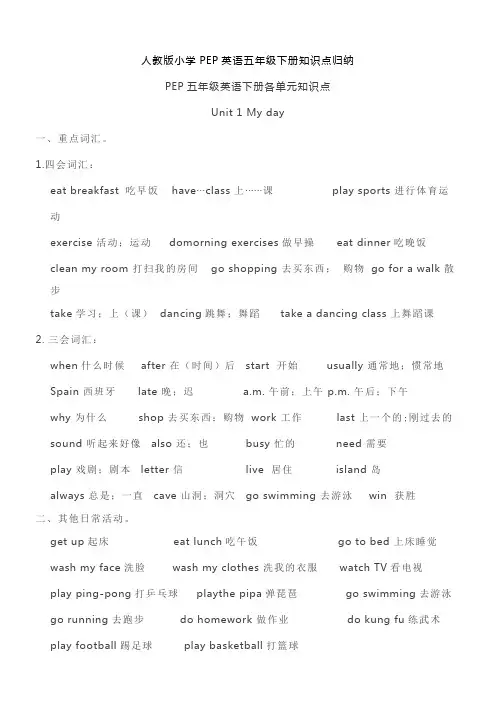
人教版小学PEP英语五年级下册知识点归纳PEP五年级英语下册各单元知识点Unit 1 My day一、重点词汇。
1.四会词汇:eat breakfast 吃早饭 have···class 上······课play sports 进行体育运动exercise 活动;运动 domorning exercises做早操eat dinner吃晚饭clean my room 打扫我的房间go shopping 去买东西;购物go for a walk 散步take学习;上(课) dancing跳舞;舞蹈 take a dancing class 上舞蹈课2. 三会词汇:when什么时候after 在(时间)后start 开始usually 通常地;惯常地Spain 西班牙late 晚;迟 a.m. 午前;上午 p.m. 午后;下午why 为什么shop 去买东西;购物work 工作last 上一个的;刚过去的sound 听起来好像also 还;也busy 忙的 need 需要play 戏剧;剧本letter 信live 居住island 岛always 总是;一直cave 山洞;洞穴go swimming 去游泳 win 获胜二、其他日常活动。
get up起床 eat lunch吃午饭 go to bed 上床睡觉wash my face洗脸 wash my clothes 洗我的衣服 watch TV看电视play ping-pong打乒乓球 playthe pipa弹琵琶 go swimming去游泳go running去跑步 do homework 做作业 do kung fu练武术play football踢足球 play basketball打篮球三、频度副词。
always总是,一直(100%) usually通常(80%)often 经常(60%) sometimes(30%)有时四、疑问词。
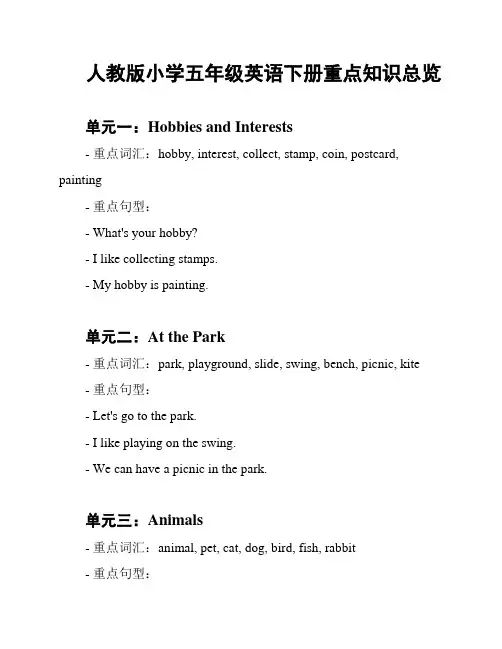
人教版小学五年级英语下册重点知识总览单元一:Hobbies and Interests- 重点词汇:hobby, interest, collect, stamp, coin, postcard, painting- 重点句型:- What's your hobby?- I like collecting stamps.- My hobby is painting.单元二:At the Park- 重点词汇:park, playground, slide, swing, bench, picnic, kite- 重点句型:- Let's go to the park.- I like playing on the swing.- We can have a picnic in the park.单元三:Animals- 重点词汇:animal, pet, cat, dog, bird, fish, rabbit- 重点句型:- Do you have any pets?- I have a pet cat.- The bird is singing.单元四:Food and Drinks- 重点词汇:food, drink, apple, banana, orange, milk, water- 重点句型:- What's your favorite food?- I like eating apples.- Can I have some water?单元五:Weather and Seasons- 重点词汇:weather, sunny, cloudy, rainy, snowy, spring, summer, autumn, winter- 重点句型:- What's the weather like today?- It's sunny and warm.- I like playing in the snow.单元六:My Family- 重点词汇:family, father, mother, brother, sister, grandfather, grandmother- 重点句型:- How many people are there in your family?- I have one brother and one sister.- My grandparents live with us.单元七:School Life- 重点词汇:school, classroom, teacher, student, desk, chair, book, pen- 重点句型:- What's your favorite subject?- I like English.- We study at school.单元八:Sports and Activities- 重点词汇:sports, activity, football, basketball, volleyball, swimming, dancing- 重点句型:- Do you like sports?- Yes, I like playing football.- Let's go swimming together.单元九:Transportation- 重点词汇:transportation, car, bus, bicycle, taxi, train, subway - 重点句型:- How do you go to school?- I go to school by bus.- I want to take a train.单元十:Occupations- 重点词汇:occupation, doctor, teacher, nurse, firefighter, policeman, musician- 重点句型:- What do you want to be in the future?- I want to be a doctor.- My mom is a teacher.以上是人教版小学五年级英语下册的重点知识总览,希望对你有帮助!。
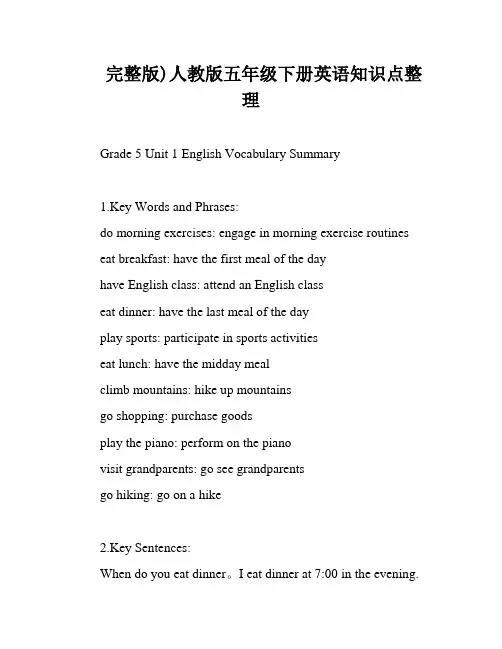
完整版)人教版五年级下册英语知识点整理Grade 5 Unit 1 English Vocabulary Summary1.Key Words and Phrases:do morning exercises: engage in morning exercise routines eat breakfast: have the first meal of the dayhave English class: attend an English classeat dinner: have the last meal of the dayplay sports: participate in sports activitieseat lunch: have the midday mealclimb mountains: hike up mountainsgo shopping: purchase goodsplay the piano: perform on the pianovisit grandparents: go see grandparentsgo hiking: go on a hike2.Key Sentences:When do you eat dinner。
I eat dinner at 7:00 in the evening.When do you get up。
I usually get up at 12:00 at noon.What do you do on the weekend。
Usually。
I watch TV and go shopping。
Sometimes。
I go hiking.I often play football.3.Important Points:Synonyms: eat breakfast - have breakfast。
eat lunch - have lunch。
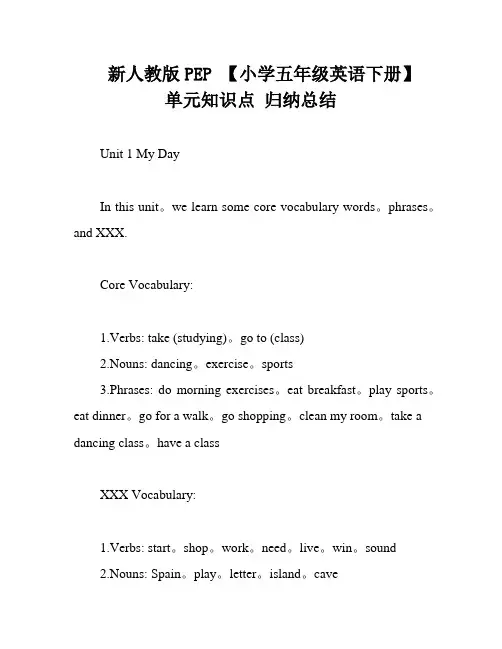
新人教版PEP 【小学五年级英语下册】单元知识点归纳总结Unit 1 My DayIn this unit。
we learn some core vocabulary words。
phrases。
and XXX.Core Vocabulary:1.Verbs: take (studying)。
go to (class)2.Nouns: dancing。
exercise。
sports3.Phrases: do morning exercises。
eat breakfast。
play sports。
eat dinner。
go for a walk。
go shopping。
clean my room。
take a dancing class。
have a classXXX Vocabulary:1.Verbs: start。
shop。
work。
need。
live。
win。
sound2.Nouns: Spain。
play。
letter。
island。
cave3.ns: after4.XXX: when。
XXX。
a.m。
p.m。
why。
last。
also。
busy5.nal Vocabulary: frequency adverbs (always。
usually。
sometimes)Phrases:watch TV。
eat lunch。
go to bed。
go swimming。
go home。
go to schoolCore Sentence Structure:When do you do morning exercises?" "At 7 o'clock."XXX phrase is "good job" to praise XXX.Which season do you like best。
I like winter best。
This sentence means "which one do you like the most" and "like。
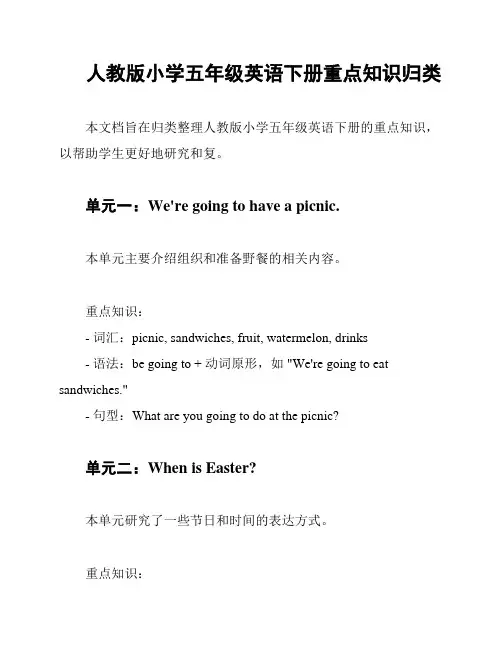
人教版小学五年级英语下册重点知识归类本文档旨在归类整理人教版小学五年级英语下册的重点知识,以帮助学生更好地研究和复。
单元一:We're going to have a picnic.本单元主要介绍组织和准备野餐的相关内容。
重点知识:- 词汇:picnic, sandwiches, fruit, watermelon, drinks- 语法:be going to + 动词原形,如 "We're going to eat sandwiches."- 句型:What are you going to do at the picnic?单元二:When is Easter?本单元研究了一些节日和时间的表达方式。
重点知识:- 词汇:Easter, Christmas, New Year's Day, Halloween- 语法:疑问词when和具体时间的表达,如 "When is Easter?"- 句型:When is Christmas?单元三:Do you want to go to a movie?本单元研究了表达意愿和邀请的相关内容。
重点知识:- 词汇:movie, park, zoo, museum, swimming pool- 语法:do you want to + 动词原形,如 "Do you want to go to a movie?"- 句型:Do you want to go to the park?单元四:Can you swim?本单元介绍了一些体育运动和能力的表达方式。
重点知识:- 词汇:swim, run, jump, skate, ride- 语法:can + 动词原形,如 "Can you swim?"- 句型:Can you ride a bike?单元五:What's the matter with you?本单元主要研究了描述身体状况和感受的表达方式。
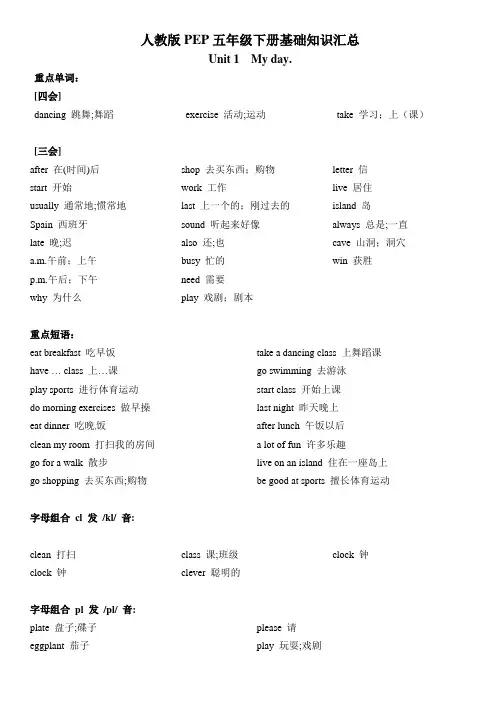
人教版PEP五年级下册基础知识汇总Unit 1 My day.重点单词:[四会]dancing 跳舞;舞蹈exercise 活动;运动take 学习;上(课)[三会]after 在(时间)后start 开始usually 通常地;惯常地Spain 西班牙late 晚;迟a.m.午前;上午p.m.午后;下午why 为什么shop 去买东西;购物work 工作last 上一个的;刚过去的sound 听起来好像also 还;也busy 忙的need 需要play 戏剧;剧本letter 信live 居住island 岛always 总是;一直cave 山洞;洞穴win 获胜重点短语:eat breakfast 吃早饭have … class 上…课play sports 进行体育运动do morning exercises 做早操eat dinner 吃晚饭clean my room 打扫我的房间go for a walk 散步go shopping 去买东西;购物take a dancing class 上舞蹈课go swimming 去游泳start class 开始上课last night 昨天晚上after lunch 午饭以后a lot of fun 许多乐趣live on an island 住在一座岛上be good at sports 擅长体育运动字母组合cl 发/kl/ 音:clean 打扫clock 钟class 课;班级clever 聪明的clock 钟字母组合pl 发/pl/ 音:plate 盘子;碟子eggplant 茄子please 请play 玩耍;戏剧重点句型:1.询问别人什么时候做某事的问句及回答:-- When do/does + 主语+ 动词(短语)原形(+ 其他)?-- 主语(+ 频度副词)+ 动词(短语)原形/ 第三人稀单数形式+ at + 具体时间/ At + 具体时间.-- When do you get up? 你什么时候起床?-- I get up at 5 o'clock. 我5点起床。
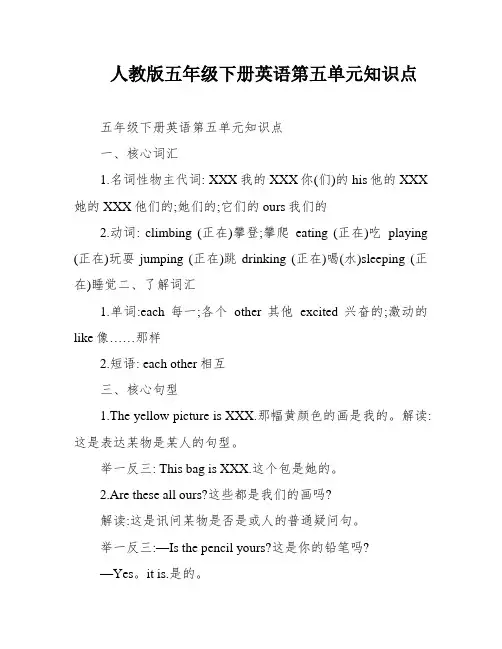
人教版五年级下册英语第五单元知识点五年级下册英语第五单元知识点一、核心词汇1.名词性物主代词: XXX我的XXX你(们)的his他的XXX 她的XXX他们的;她们的;它们的ours我们的2.动词: climbing (正在)攀登;攀爬eating (正在)吃playing (正在)玩耍jumping (正在)跳drinking (正在)喝(水)sleeping (正在)睡觉二、了解词汇1.单词:each每一;各个other其他excited兴奋的;激动的like像……那样2.短语: each other相互三、核心句型1.The yellow picture is XXX.那幅黄颜色的画是我的。
解读:这是表达某物是某人的句型。
举一反三: This bag is XXX.这个包是她的。
2.Are these all ours?这些都是我们的画吗?解读:这是讯问某物是否是或人的普通疑问句。
举一反三:—Is the pencil yours?这是你的铅笔吗?—Yes。
it is.是的。
3.—Whose is it?它是谁的?—It's Zhang Peng's.是XXX的。
解读:当透露表现物品的附属干系时用名词性物主代词或名词一切格来透露表现。
人称代词表称号主格宾格描述词性物主代词名词性物主代词I(我)me(我) my(我的)mine(我的)you(你;你们)your(你的;你们的)yours(你的;你们的)you(你;你们)he(他)him(他)his(他的)his(他的)she(她) her(她) her(她的)hers(她的)it(它)it(它)its(它的)we(我们)us(我们)theythemtheirits(它的)ours(我们的)our(我们的)[他(她;它)们][他(她;它)们][他(她;它)们的]XXX[他(她;它)们的]4.—XXX?他在喝水吗?—No。
XXX.不,不是。
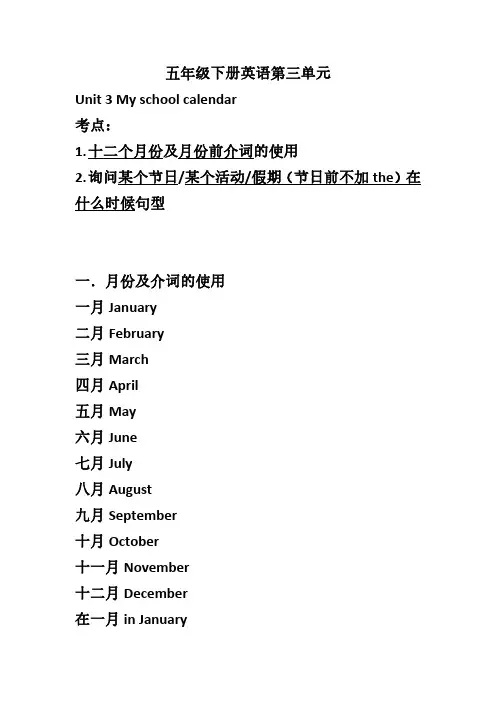
五年级下册英语第三单元
Unit3My school calendar
考点:
1.十二个月份及月份前介词的使用
2.询问某个节日/某个活动/假期(节日前不加the)在什么时候句型
一.月份及介词的使用
一月January
二月February
三月March
四月April
五月May
六月June
七月July
八月August
九月September
十月October
十一月November
十二月December
在一月in January
在六月in June
在十月in October
在十二月in December
在什么时候句型
句型结构:
问:When is+节日/the活动/the假期?答:It's in+月份.
1.植树节是什么时候?在三月。
When is Tree Planting Day?
It’s in March.
2.今年的学校旅行是什么时候?在五月。
When is the school trip this year?
It’s in May.
3.英语派对是什么时候?在四月。
When is the English party?
It’s in April.
4.圣诞节是什么时候?在十二月。
When is Christmas?
It’s in December.
5.国庆节在什么时候?在十月。
When is National Day?
It’s in October.。
千里之行,始于足下。
人教版五年级英语下册全册知识点总结人教版五年级英语下册全册知识点总结人教版五年级英语下册的内容主要包括Unit 5 My clothes、Unit 6 This is my sister、Unit 7 That’s the way、Unit 8 It has big eyes、Unit 9A trip to the zoo、Unit 10 Our school、Unit 11 My favorite subject、Unit 12 He’s a policeman、Unit 13 Whose clothes are these?、Unit 14 What does he look like?、Unit 15 How do you go to school?、Unit 16 At the zoo 共12个单元。
下面对这些单元的知识点进行总结:Unit 5 My clothes:1.句型 I am wearing a/an + 单数可数名词、句型 What are you wearing? I am wearing + 衣物名称。
2.颜色的表达形式 red(红色)、blue(蓝色)、yellow(黄色)、green(绿色)、pink(粉红色)等。
3.衣物的名称:T-shirt(卫衣)、skirt(裙子)、shirt(衬衣)、jeans(牛仔裤)、sweater(毛衣)4.衣物的价格:one yuan(一元)、seven yuan(七元)等。
Unit 6 This is my sister:1.句型 Is this your/our…? Yes, it is./ No, it isn’t.2.家庭成员的名称:father(父亲)、mother(母亲)、sister(姐姐)、brother(弟弟)等。
3.形容词性物主代词:my(我的)、your(你的)、his(他的)、her(她的)等。
人教版五年级英语下册全册知识点总结回答方式多样,以下是一些例子:I usually play sports or go shopping on the weekend.(我通常在周末进行体育运动或去购物。
)I XXX(我周六上舞蹈课,周日在家休息。
)It depends。
Sometimes I hang out with friends。
sometimes I do some housework。
and sometimes I just watch TV.(这要看情况。
有时我和朋友出去玩,有时我做些家务,有时我就看电视。
)注意:询问别人周末做什么时,可以使用what或how来引导问句。
回答时,可以使用usually。
sometimes等频度副词来表达经常性或偶尔性的活动。
Unit 1一、重点词汇吃早餐:eat breakfast 上······课:have。
class进行体育运动:play sports做早操:do morning exercises 打扫我的房间:clean my room 去购物:go shopping舞蹈:dancing上午:a.m.通常地:usually二、其他日常活动起床:get up上床睡觉:go to bed活动,运动:exercise吃晚饭:eat XXX散步:go for a walk研究,上(课):XXX上舞蹈课:take a dancing class下午:p.m.吃午饭:eat XXX洗脸:XXX洗我的衣服:XXX看电视:watch TV打乒乓球:play ping-pong弹琵琶:play the pipa去游泳:go swimming去跑步:go running做作业:do homework练武术:do XXX踢足球:play football打篮球:play basketball三、语音cl→ [cl]:clean。
人教版小学英语五年级下册知识点总结本文档汇总了人教版小学英语五年级下册的知识点。
以下是各个单元的重点内容概述:Unit 1- 词汇:动词过去式,如played, went等。
- 句型:一般过去时的肯定、否定和疑问句,如Did you go to the park?等。
Unit 2- 词汇:描述动作的词汇,如shouted, jumped等。
- 句型:谈论过去发生的动作,如What did you do yesterday?等。
Unit 3- 词汇:描述天气的词汇,如rainy, sunny等。
- 句型:描述天气状况,如It's sunny today.等。
Unit 4- 词汇:介词短语,如on the table, under the bed等。
- 句型:描述物品位置,如The book is on the table.等。
Unit 5- 词汇:描述交通工具的词汇,如car, bus等。
- 句型:谈论交通工具,如How do you go to school?等。
Unit 6- 词汇:描述人物外貌的词汇,如thin, tall等。
- 句型:描述人物外貌特征,如She is thin and tall.等。
Unit 7- 词汇:描述食物的词汇,如rice, noodles等。
- 句型:谈论喜好的食物和饮品,如I like noodles.等。
Unit 8- 词汇:描述家庭成员的词汇,如father, sister等。
- 句型:介绍家庭成员,如This is my brother.等。
Unit 9- 词汇:描述服装的词汇,如shirt, dress等。
- 句型:描述衣物,如I am wearing a yellow shirt.等。
总结以上内容,希望对您的研究有所帮助。
人教版英语五年级下册知识点总结一、词汇核心词汇学校生活:classroom, library, playground, office, restroom, schedule, lesson, homework, break, lunch家庭成员:family, father, mother, brother, sister, uncle, aunt, cousin日常活动:get up, go to bed, wash face, brush teeth, eat breakfast, do homework, watch TV, play computer games 食物与饮料:hamburger, hot dog, sandwich, pizza, cake, cookie, milk, juice, water拓展词汇学科名称:math, science, Chinese, English, PE, art, music 颜色与衣物:red, blue, yellow, green, white, black, shirt, pants, shoes, hat, socks动物与植物:cat, dog, fish, bird, rabbit, flower, tree, grass, leaf节假日与活动:birthday, Christmas, Spring Festival, summer vacation, winter vacation, party, picnic二、语法现在进行时表达正在进行的动作或状态。
be动词(am/is/are)+动词-ing形式。
例句:What are you doing? I am reading a book. They are playing football.一般现在时表达经常性的行为或状态。
主语为第三人称单数时,动词形式要发生改变。
例句:She always washes her hands before meals. He often watches TV in the evening.一般过去时表达过去某个时间发生的动作或状态。
⼀、重点短语 1. look at 看⼀看 2. over there 在那边 3. in English ⽤英语 4. excuse me 打扰了 5. in the pond 在池塘⾥ 6. play with 和… ⼀起玩 7. of course 当然 8. swim well 游泳好 9. pet shop 宠物店 10. a lot of 很多 11. jump through a ring 越过圆环 12. ride a horse 骑马 13. ride a bike 骑⾃⾏车 14. climb up a ladder 爬梯⼦ 15. come here 过来 16. come along 过来 17. come with me 跟我来 18. show… around 带…参观 19. this way 这边⾛ 20. borrow … from 从…借 21. borrow books 借书 22. read stories 读故事 23. make things 制作东西 24. speak English 说英语 25. draw pictures 画画 26. have art classes 上美术课 27. dance room 舞蹈教室 28. how often 多久⼀次 29. science lab 科学实验室 30. language lab 语⾳室 31. how many 多少 32. other activities 其他活动 33. do experiments 做实验 34. do listening 练听⼒ 35. observe things 观察事物 36. do speaking 练⼝语 37. New Year’s Day 元旦 38. meeting hall 会议⼤厅 39. Children’s Day ⼉童节 40. be good at 擅长 41. be interested in 对…感兴趣 42. music club ⾳乐俱乐部 43. no one 没有⼈ 44.play the violin 拉⼩提琴 45. art club 美术俱乐部 46. come into 进⼊ 47.listen to music 听⾳乐 48. cut out 剪下 49. come from 来⾃ 50. up and down 上上下下 51. in groups 成组 52. science corner 科学⾓ 53. group work ⼩组活动 54. do project work 做项⽬制作 55. art corner 美术⾓ 56. computer corner 电脑⾓ 57.play football 踢⾜球 58. be famous for 因…闻名 59. study plants and animals 研究动植物 60. do exercises 做运动 61. on the field 在操场上 62. do printing on the paper 在纸上印刷 63. how about …怎么样? 64.go on field trips ⽥野考察 65. play volleyball 打排球 66. play basketball 打篮球 67. play hockey 打曲棍球 68. play rugby 打橄榄球 69. in the forest 在森林⾥ 70. have a look at 看⼀看 71. here you are 给你 72. how much 多少(钱) 73. a pair of ⼀双;⼀对 74. try on 试穿 75. shoe shop 鞋店 76. clothes shop 服装店 77. make a shopping list 做购物单 78. sports shop 体育⽤品商店 79. cake shop 蛋糕店 80. pay for 付钱 81. feel well 感觉好 82. see a doctor 看医⽣ 83. take good care of 好好照顾 84. have a bad cold 得了重感冒 85. have a fever 发烧 86. have a stomachache 胃疼 87. have a headache 头疼 88. have a toothache ⽛疼 89. have a cough 咳嗽 90. go to a concert 听⾳乐会 91. do maths problems 做数学题 92. go to the music club 去⾳乐俱乐部 93. have to 不得不 94. stay in bed 待在床上 95. get well 康复 96. be worried about 担⼼ 97. don’t worry 别担⼼ 98.help … with 帮助…做某事 99. in the hospital 在医院⾥ ⼆、重点短语讲解 1. play with 和…⼀起玩 play with sb.(某⼈) 和…⼀起玩 play with sth.(某物) 玩某物 e.g. Lucy and Lily are playing with their mother. Lucy and Lily are playing with their doll. 2. a lot of 很多 a lot of = lots of + 可数名词复数或不可数名词 e.g. 同义句转换 There are a lot of apples on the table. = There are ______ ______ apples on the table. (答案:lots of) 3. how often 多久⼀次 how often 是⼀个特殊疑问词,就频率提问。
人教版五年级下册英语知识点整理1、主要单词和短语:do morning exercises 晨练,做早操eat breakfast 吃早饭have English class 上英语课eat dinner 吃晚饭play sports 进行体育活动eat lunch 吃午饭climb mountains 爬山go shopping 购物,买东西play the piano 弹钢琴visit grandparents 看望(外)祖父母go hiking 去远足二、主要句子:When do you eat dinner? 你什么时候吃晚饭?I eat dinner at 7:00 in the evening. 我晚上七点吃晚饭。
When do you get up? 你什么时候起床?I usually get up at 12:00 at noon. 我通常在中午12点起床。
What do you do on the weekend? 你在周末干什么?Usually I watch TV and go shopping. 我通常看电视和购物。
I often play football. 我经常踢足球。
Sometimes I go hiking. 有时候我去远足。
三、重要知识点同义词:eat breakfast-have breakfast , eat lunch-have lunch, eat dinner-have dinner play sports-do sports, usually-often复数形式:policeman-policemen policewoman-policewomen现在分词:tell-telling第三人称单数:say-says同义句:What do you do ? ---What are you? 你是干什么的?表示频度的副词:always 总是,一直;usually 通常,常常;often 经常;sometimes 有时候以复数形式出现的词组:visit grandparents ,plant trees介词后跟表示时间的词语时,表示在某年、某月、某个季节,某个时候(在上午,在下午,在晚上)用in;表示在某一天,在星期几用on,在具体的几点几分用at.too 和either的用法区别:too和either都是“也”的意思,但too用于肯定句,either用于否定句。
五年级下册英语第二单元知识点整理一、主要单词和短语:season 季节spring 春天summer 夏天fall 秋天winter 冬天swim 游泳fly kites 放风筝skate 滑冰make a snowman 堆雪人plant trees 种树二、主要句子:Which season do you like best? 你最喜欢哪个季节?I like winter best. 我最喜欢冬天。
Summer is good, but fall is my favourite season.夏天是很好,但是秋天是我最喜爱的季节。
Why do you like summer? 你为什么喜欢夏天?Because I can swim in the lake. 因为我可以在湖里游泳。
Why do you like winter? 你为什么喜欢冬天?Because I can sleep a long time. 因为我可以睡很长时间的觉。
三、知识点同义词:autumn-fall(秋天)三单:对应词:wake up-sleep ;go to bed-get up同义句:What's your favourite season?(你最喜欢的季节是什么?)----Which season do you like best?(你最喜欢哪个季节?)play with 玩雪,play in the snow在雪中玩, 如果在横线后面有the ,则选择in , 如果在横线后面没有the , 则选择with.like后面不能直接跟动词。
如果需要跟动词或动词性词组时,则需在like后面加to. 如果不加to. 就要把后面的动词变成相应的动名词形式。
如:I like to swim ===I like swimming.当表示某地某个季节的天气情况时,要把季节放在前面,地点放在后面。
其结构为:What's the weather like in 季节in 地点?五年级下册英语第三单元知识点整理一、主要单词:January (Jan.)一月February (Feb.)二月March (Mar.)三月April(Apr.)四月May 五月June 六月July 七月August(Aug.)八月September(Sept.)九月October(Oct.)十月November (Nov.)十一月December (Dec.)十二月二、主要句子1. When is your birthday? 你的生日是什么时候--It's in May. 在五月。
2. My birthday is in June. Uncle Bill's birthday is in June, too. 我的生日在六月。
比尔叔叔的生日也在六月。
3. Is her birthday in June? 她的生日在六月吗?--Yes. 是的。
4.What's the date? 是几月几日?--June 9th . 六月九日。
5. What's the date today? 今天是几月几日?-- It's April 10th. 四月十日。
三、主要知识点:1、关于月份:(1)五月May , 六月June, 七月July,没有简写形式。
九月September 的简写形式是前四个字母加点Sept. 其他八个月的简写形式是前三个字母加点。
(2)无论是完全形式还是简写形式,表示12个月的单词的第一个字母都要大写。
2、关于基数词变序数词。
(1)一般情况下,直接在基数词后面加th. (one , two , three 除外)。
one-first , two-second , three-third .(2)以ve结尾的基数词,变ve为f, 再加th. 如:five-fifth , twelve-twelfth.(3)以t结尾的基数词,直接加h.如eight-eighth.(4)以不发音的字母e结尾的,丢掉不发音的字母e,再加th. 如nine-ninth.(5)以y结尾的整十数,在变为序数词时,将y变为ie, 再加th. 如twenty-twentieth .(6)20以上的两位数,变为序数词时,十位数不变,只将个位上的数变为序数词。
如:twenty-one----twenty-first , twenty-two-twenty-second , thirty-four-thirty-fourth .(7)序数词的简写形式为表示该词的阿拉伯数字加上该单词的最后两个字母,最后两个字母要变成上标格式。
如:first-1st , second-2nd , third-3rd , fourth-4th . twentieth-20th3. 在回答When is your birthday? 这个问题时,如果只说明生日在几月份,在月份前用in. 如My birthday is in July.如果要具体说明生日是在几月几日,则要把in去掉,直接用is,或者在is后加on.如My birthday is June 9th. 或My birthday is on June 9th .4.注意区分两个句子:What day is it today ? 今天星期几?What's the date today? 今天是几月几日?5. 根据要求写单词:make (现在分词)---making. send(现在分词)---sending.6.句子:How many birthdays are in October ? 有几个人的生日在十月?There are 3.7. My birthday is in February . (变为一般疑问句)---Is your birthday in February?她有计算机吗?当第三人称单数和句子中出现了does时,其他动词必须使用原型。
9、读序数词时,前面一定要加the. 如October 1st .读作October the first.10、同义句:Who has a birthday in October?===Whose birthday is in October?五年级下册英语第四单元知识点整理一、主要单词:draw pictures 画画 drawing pictures 正在画画do the dishes 洗碗碟doing the dishes 正在洗碗碟cook dinner 做饭cooking dinner 正在做饭read a book 读书reading a book 正在读书answer the phone 接电话 answering the phone 正在接电话listen to music 听音乐listening to music 正在听音乐wash clothes 洗衣服washing clothes 正在洗衣clean the room 打扫房间cleaning the room 正在打扫房间write a letter 写信writing a letter 正在写信write an e-mail 写电子邮件 writing an e-mail 正在写电子邮件二、主要句子:1. This is Zhang Peng .(电话用语)我是张朋。
What are you doing? 你正在干什么?2.I'm doing the dishes. 我正在洗碗碟。
I'm reading a book. 我正在读书。
3.Grandpa is writing a letter. 爷爷正在写信。
Brother is doing homework. 弟弟正在做作业。
4.Mom is cooking dinner in the kitchen. 妈妈正在厨房里做饭。
5.Dad is writing an e-mail in the study. 爸爸正在书房里写电子邮件。
三、知识点:1、在电话中介绍自己时,可以用“It's …”或者‘This is …'.但是不能用“I am …”或者“My name is …”2.在电话中表另一个人接电话时,应该说:“Can I speak to …?”3、告诉别人接电话时,说:There is a call for you.4、在接电话时请别人稍候说:Hold on please.或者Please hold on.5、动词变为现在分词(加ing)的规则:(1)一般情况下,在动词的后面直接加ing.如:play-playing clean-cleaning draw-drawing cook-cooking (2)以单个不发音的字母e结尾的动词,去掉不发音的字母e,再加ing .如:(3)以重读闭音世结尾的动词,如果词尾只有一个辅音字母,则要先双写这个辅音字母,再加ing.如:run-running swim-swimming put-putting sit-sitting set-setting五年级下册英语第五单元知识点整理一、主要单词:fly 飞flying 正在飞walk 走walking 正在走jump 跳jumping 正在跳run 跑running 正在跑swim 游泳swimming 正在游climb 爬climbing 正在爬fight 打架fighting 正在打架swing 荡秋千swinging 正在荡秋千drink water 喝水drinking water 正在喝水二、主要句子:1. What is it doing? 它正在干什么?It's eating bananas. 它正在吃香蕉。